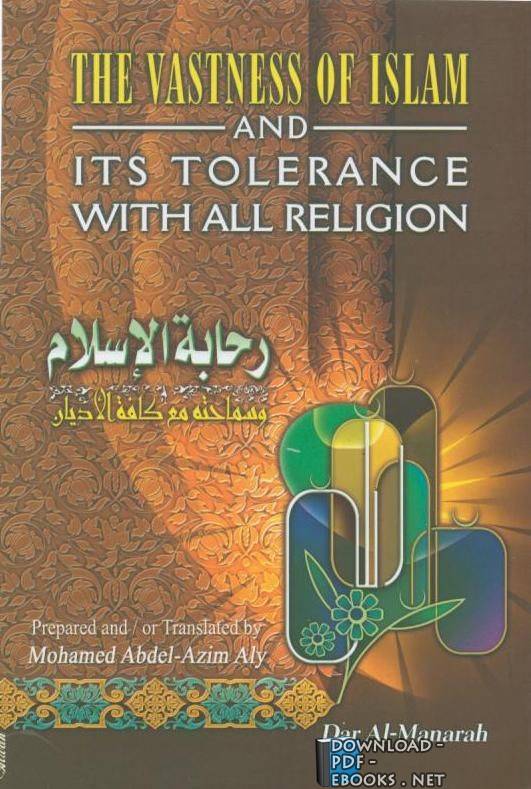📘 قراءة كتاب The Vastness of Islam and its Tolerance with all Religion أونلاين


The Vastness of Islam and its Tolerance with all Religion من Islamic Books
The Vastness of Islam and its Tolerance with all Religion من Islamic Books
اسم الكتاب: the vastness of islam and its tolerance with all religion رحابة الإسلام وسماحته مع كافة الأديان
اسم الكاتب: mohamed abdel azim aly محمد عبد العظيم علي
Religious Tolerance in IslamReligious Tolerance in Islam
One of the most important aspects of the Human Rights issue is the respect and tolerance which society must show towards the religions of other people; this, of course, includes the issue of freedom of religion. Tonight I would like to talk very briefly about the Islamic point of view on religious tolerance.
The Qur'anic Point of View
Islam, like Judaism and Christianity, believes in prophets and messengers of God- One interesting way of understanding the Islamic view on freedom of religion is to look at the role of the prophets and messengers.
Had they been sent to forcefully bring the people into their teachings? Were Moses, Jesus and Muhammad ordered by the Almighty to impose their teachings upon the people by sword? Absolutely not! Look at the Qur'an, the holy scripture of Islam; the revealed words of God where He clearly outlines the duty of his messengers by saying:
“(And as for My messenger,) there is no (obligation) on him except to deliver (the. message). God knows what yon expose and what conceal”. (5:99).
Once the people of Mecca said to Prophet Muhammad that if god did not want them to worship idols then why He does not forcefully prevent them from doing so. Then God sent the following message:
“(O Muhammad) This is not a new excuse; those who weft before, them made, the same excuses. Is there anything upon the messengers except the dear conveying of the message”. (16: 35).
So we see that from the Qur'anic point of view, the mission of the prophets and messengers of God was not to forcefully impose their teachings on the people but to guide them and ask them to accept God with their own will, in one revelation, God says to Prophet Muhammad:
"But if the people turn away (then do not be sad because) We did ma sent you to be a guardian over them. It is for you only to deliver the message." (42:43).
The Qur’an clearly says that religion cannot be forced on anyone. It says,
"There is no compulsion in (accepting) the religion (of Islam)…”
Why? Because:
"truly the right way has become clearly distinct from error. " (2:256).
The Prophet’s Example
The Prophet of Islam faced much difficulty and opposition in his own birth- place, the city of Mecca. He was eventually forced to migrate to Medina. But in spite of all the opposition and even physical torture that his followers suffered in Mecca, Prophet Muhammad always approached the unbelievers of Mecca with tolerance. At one stage of his mission, the Prophet read to them a short chapter from the revelation:
“O you who do not believe! I worship not what you worship, and you are not worshipping what I worship; nor am 1 worshipping what you worship; neither -art you worshipping what I worship. Therefore, to you your religion; and to me my religion!” (chap. 109)
When Prophet Muhammad migrated to Medina, he found that besides those who hid accepted Islam, there was a large Jewish community in that, city but this did not bother him He did not contemplate on forcing them into the Fold of Islam, instead, he made a peace agreement with them and called them ahlul kitab—the people of the Scripture. This was indeed the supreme example of tolerance shown towards the followers of other religions.
The peace agreement between the Prophet and the Jews of Medina dearly guaranteed the physical safety and security of the Jewish community and also the freedom to practise their religion freely as long 35 that community also abided the terms of the treaty.
So we see that even historically, the Prophet of Islam was prepared to live in peace with the followers of other monotheistic religions, especially Judaism and Christianity.
Even the letters that the Prophet wrote to the rulers of various countries and nations around Arabia are interesting documents for our discussion. In none of the letters does the Prophet threaten them of a military aggression if they did not accept the message of Islam. The letter to the Christian King of Abyssinia ends with the words: "I have conveyed the message and now it is up to you to accept it. Once again, peace be upon him who follows the true guidance."
We have an interesting historical document with us from our fourth Imam, ‘Ali Zaynul Abidin (a.s,). This document is entitled as Risalatu 'l huquq which means “The Charter of Rights”.
In this Risalah, the Imam has mentioned rights related to various issues and people in human society, the last part is on the rights of non-Muslims in a Muslim society. Among other things, it says: “And there must be a barrier keeping you from doing any injustice to them, from depriving them of the protection provided by God, and from flaunting the commitments of God and His Messenger concerning them.
Because we have been told that the Holy Prophet said, "Whosoever does injustice to a protected non- Muslim, then I will be his enemy (on the Day of Judgement)," In a letter which Imam 'Ali wrote for his governor in Egypt, he says, "Sensitive your heart to mercy for the subjects, and to affection and kindness for them. Do not stand over them like greedy beasts who feel it is enough to devour them, for they are of two kinds; either your brother in faith or like you in Creation." {Nahju 'l-Balagha, letter 53).
سنة النشر : 2004م / 1425هـ .
حجم الكتاب عند التحميل : 1.9 ميجا بايت .
نوع الكتاب : pdf.
عداد القراءة:
اذا اعجبك الكتاب فضلاً اضغط على أعجبني و يمكنك تحميله من هنا:

شكرًا لمساهمتكم
شكراً لمساهمتكم معنا في الإرتقاء بمستوى المكتبة ، يمكنكم االتبليغ عن اخطاء او سوء اختيار للكتب وتصنيفها ومحتواها ، أو كتاب يُمنع نشره ، او محمي بحقوق طبع ونشر ، فضلاً قم بالتبليغ عن الكتاب المُخالف:
 قبل تحميل الكتاب ..
قبل تحميل الكتاب ..
يجب ان يتوفر لديكم برنامج تشغيل وقراءة ملفات pdf
يمكن تحميلة من هنا 'http://get.adobe.com/reader/'
دار المنار
 ❰ ناشرين لمجموعة من المؤلفات أبرزها ❞ خطب الجمع والأعياد ألقيت على منبر خير العباد صلى الله عليه وسلم ❝ ❞ فضل تعدد الزوجات ❝ ❞ تفسير المنار ❝ ❞ الفتح القسي في الفتح القدسي حروب صلاح الدين وفتح بيت المقدس ❝ ❞ تفسير سورة يوسف ❝ ❞ التحالف السياسي في الإسلام ❝ ❞ الفقه الواضح من الكتاب والسنة على المذاهب الأربعة ❝ ❞ آثار تطبيق الشريعة الإسلامية في منع الجريمة الطبعة الثانية ❝ ❞ ماذا يقول الكتاب المقدس عن محمد [صلى الله عليه وسلم]؟ ❝ ❞ الأمن في الإسلام ❝ ومن أبرز المؤلفين : ❞ أحمد ديدات ❝ ❞ محمد بن علي الشوكاني ❝ ❞ محمد بن جميل زينو ❝ ❞ محمد رشيد رضا ❝ ❞ سليمان بن ناصر العلوان ❝ ❞ منير محمد الغضبان ❝ ❞ محمد بكر إسماعيل ❝ ❞ أحمد عمر هاشم ❝ ❞ محمد بن عبد الرحمن المغراوي ❝ ❞ عبد الله بن محمد بن زاحم ❝ ❞ محمود حمدى زقزوق ❝ ❞ عبد القادر بن حبيب الله السندي ❝ ❞ إبراهيم خليل أحمد ❝ ❞ محمد سعيد رسلان ❝ ❞ عابد بن محمد السفياني ❝ ❞ د.محمد محمد داود ❝ ❞ محمد بن عبد الله الزاحم ❝ ❞ محمد محمد زيتون ❝ ❞ عبد القادر حبيب الله السندي ❝ ❞ عبد الله بن أحمد بن محمد بن قدامة المقدسي أبو محمد عبد الرحمن بن محمد بن أحمد بن قدامة المقدسي شمس الدين أبو الفرج ❝ ❞ سفيان بن عيينة ❝ ❞ أمير بن أحمد قروي ❝ ❞ أبو عبد الرحمن ❝ ❞ عماد الدين الكاتب الأصفهاني ❝ ❞ عبد السلام بن برجس بن ناصر آل عبد الكريم ❝ ❞ mohamed abdel azim aly محمد عبد العظيم علي ❝ ❞ عبد الرحمن بن محمد حافظ ❝ ❞ د. عبد الله عبد الرازق مسعود السيد ❝ ❞ على طنطاوى ❝ ❱.المزيد.. كتب دار المنار
❰ ناشرين لمجموعة من المؤلفات أبرزها ❞ خطب الجمع والأعياد ألقيت على منبر خير العباد صلى الله عليه وسلم ❝ ❞ فضل تعدد الزوجات ❝ ❞ تفسير المنار ❝ ❞ الفتح القسي في الفتح القدسي حروب صلاح الدين وفتح بيت المقدس ❝ ❞ تفسير سورة يوسف ❝ ❞ التحالف السياسي في الإسلام ❝ ❞ الفقه الواضح من الكتاب والسنة على المذاهب الأربعة ❝ ❞ آثار تطبيق الشريعة الإسلامية في منع الجريمة الطبعة الثانية ❝ ❞ ماذا يقول الكتاب المقدس عن محمد [صلى الله عليه وسلم]؟ ❝ ❞ الأمن في الإسلام ❝ ومن أبرز المؤلفين : ❞ أحمد ديدات ❝ ❞ محمد بن علي الشوكاني ❝ ❞ محمد بن جميل زينو ❝ ❞ محمد رشيد رضا ❝ ❞ سليمان بن ناصر العلوان ❝ ❞ منير محمد الغضبان ❝ ❞ محمد بكر إسماعيل ❝ ❞ أحمد عمر هاشم ❝ ❞ محمد بن عبد الرحمن المغراوي ❝ ❞ عبد الله بن محمد بن زاحم ❝ ❞ محمود حمدى زقزوق ❝ ❞ عبد القادر بن حبيب الله السندي ❝ ❞ إبراهيم خليل أحمد ❝ ❞ محمد سعيد رسلان ❝ ❞ عابد بن محمد السفياني ❝ ❞ د.محمد محمد داود ❝ ❞ محمد بن عبد الله الزاحم ❝ ❞ محمد محمد زيتون ❝ ❞ عبد القادر حبيب الله السندي ❝ ❞ عبد الله بن أحمد بن محمد بن قدامة المقدسي أبو محمد عبد الرحمن بن محمد بن أحمد بن قدامة المقدسي شمس الدين أبو الفرج ❝ ❞ سفيان بن عيينة ❝ ❞ أمير بن أحمد قروي ❝ ❞ أبو عبد الرحمن ❝ ❞ عماد الدين الكاتب الأصفهاني ❝ ❞ عبد السلام بن برجس بن ناصر آل عبد الكريم ❝ ❞ mohamed abdel azim aly محمد عبد العظيم علي ❝ ❞ عبد الرحمن بن محمد حافظ ❝ ❞ د. عبد الله عبد الرازق مسعود السيد ❝ ❞ على طنطاوى ❝ ❱.المزيد.. كتب دار المنار 

 منصّة المكتبة
منصّة المكتبة 